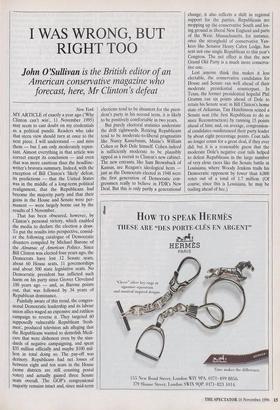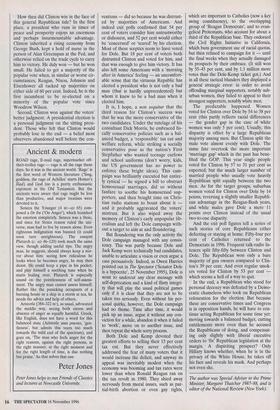I WAS WRONG, BUT RIGHT TOO
John O'Sullivan is the British editor of an
American conservative magazine who forecast, here, Mr Clinton's defeat
New York MY ARTICLE of exactly a year ago ('Why Clinton can't win', 11 November 1995) may seem to cast doubt on my credentials as a political pundit. Readers who take that stern view should turn at once to the next piece. I will understand — and miss them — but I am only moderately repen- tant. Almost everything in that article was correct except its conclusion — and even that was more cautious than the headline- writer's bravura summary. Indeed, with the exception of Bill Clinton's 'likely' defeat, its predictions — that the United States was in the middle of a long-term political realignment, that the Republicans had become the majority party and that their gains in the House and Senate were per- manent — were largely borne out by the results of 5 November.
That has been obscured, however, by Clinton's personal victory, which enabled the media to declare the election a draw. To put the results into perspective, consid- er the following catalogue of Democratic disasters compiled by Michael Barone of the Almanac of American Politics. Since Bill Clinton was elected four years ago, the Democrats have lost 12 Senate seats, about 60 House seats, 11 governorships and about 500 state legislative seats. No Democratic president has inflicted such harm on his party since Grover Cleveland 100 years ago — and, as Barone points out, that was followed by 34 years of Republican dominance.
Painfully aware of this trend, the congres- sional Democratic leadership and its labour union allies waged an expensive and ruthless campaign to reverse it. They targeted 60 supposedly vulnerable Republican 'fresh- men', produced television ads alleging that the Republicans wanted to demolish Medi- care that were dishonest even by the stan- dards of negative campaigning, and spent $35 million officially and maybe $100 mil- lion in total doing so. The pay-off was derisory. Republicans had net losses of between eight and ten seats in the House (some districts are still counting postal votes) and actually gained three Senate seats overall. The GOP's congressional majority remains intact and, since mid-term elections tend to be disasters for the presi- dent's party in his second term, it is likely to be positively comfortable in two years. But purely electoral statistics understate the drift rightwards. Retiring Republicans tend to be moderate-to-liberal pragmatists like Nancy Kassebaum, Maine's William Cohen or Bob Dole himself. Cohen indeed is sufficiently moderate to be plausibly tipped as a recruit to Clinton's new cabinet. The new entrants, like Sam Brownback of Kansas, are Reagan's ideological heirs just as the Democrats elected in 1948 were the first generation of Democratic con- gressmen really to believe in FDR's New Deal. But this is only partly a generational change; it also reflects a shift in regional support for the parties. Republicans are mopping up the conservative South and los- ing ground in liberal New England and parts of the West. Massachusetts, for instance, once the stronghold of conservative Yan- kees like Senator Henry Cabot Lodge, has sent not one single Republican to this year's Congress. The net effect is that the new Grand Old Party is a much more conserva- tive one.
Lest anyone think this makes it less electable, the conservative candidates for House and Senate ran well ahead of their moderate presidential counterpart. In Texas, the former presidential hopeful Phil Gramm ran six points ahead of Dole to retain his Senate seat; in Bill Clinton's home state of Arkansas, Tim Hutchinson seized a Senate seat (the first Republican to do so since Reconstruction) by running 15 points ahead of him; and, on average, congression- al candidates outdistanced their party leader by about eight percentage points. Coat tails no longer count for a great deal, if they ever did; but it is a reasonable guess that the moderate Dole's negative coat tails helped to defeat Republicans in the large number of very close races like the Senate battle in Louisiana, where Woody Jenkins trails his Democratic opponent by fewer than 6,000 votes out of a total of 1.7 million. (Of course, since this is Louisiana, he may be trailing ahead of her.) How then did Clinton win in the face of this general Republican tide? In the first place, a president who runs in times of peace and prosperity enjoys an enormous and perhaps insurmountable advantage. Clinton inherited a rising economy from George Bush, kept a hold of nurse in the person of Alan Greenspan at the Fed, and otherwise relied on the trade cycle to carry him to victory. He duly won — but he won small. He failed to get a majority of the popular vote when, in similar or worse cir- cumstances, Reagan, Nixon, Johnson and Eisenhower all racked up majorities on either side of 60 per cent. Indeed, he is the first incumbent to be re-elected on a minority of the popular vote since Woodrow Wilson.
Second, Clinton won against the voters' better judgment. A presidential election is a personal judgment on the sitting presi- dent. Those who felt that Clinton would probably lose in the end — a belief most observers abandoned well before the con- ventions — did so because he was distrust- ed by majorities of Americans. And indeed exit polls confirmed that 54 per cent of voters consider him untrustworthy or dishonest, and 52 per cent would either he 'concerned' or 'scared' by his election. Most of these sceptics seem to have voted for Dole. But 18 per cent of voters both distrusted Clinton and voted for him, and that was enough to give him victory. It has also left some Americans with a 'morning after in America' feeling — an uncomfort- able sense that the virtuous Republic has elected a president who is not only a bad man (that is hardly unprecedented) but whom it knew to be a bad man when it elected him.
It is, I hope, a non sequitur that the third reason for Clinton's success was that he was the more conservative of the two candidates. Under the tutelage of his consultant Dick Morris, he embraced fis- cally conservative policies such as a bal- anced budget, a 'responsible' tax cut and welfare reform, while striking a socially conservative pose as the nation's First Stepfather who wanted teenage curfews and school uniforms (don't worry, kids, the US government has no power to enforce these bright ideas). This cam- paign was brilliantly executed but entire- ly cynical — he signed a bill to obstruct homosexual marriages, did so without fanfare to soothe his homosexual sup- porters, and then bought time on Chris- tian radio stations to boast about it and it probably aggravated the voters' mistrust. But it also wiped away the memory of Clinton's early unpopular lib- eralism and left the Dole campaign with- out a target to aim at and floundering.
But floundering was the only activity the Dole campaign managed with any consis- tency. This was partly because Dole and Jack Kemp were technically bad candidates, unable to articulate a vision or even argue a case persuasively. Indeed, as Owen Harries pointed out in The Spectator (`Senator Dole is a hypocrite', 25 November 1995), Dole is wont to undercut any clear message with self-deprecation and a kind of flinty integri- ty that will play the usual political games only if it is clear that they are not to be taken too seriously. Even without his per- sonal quirks, however, the Dole campaign had no theme. Time after time, it would pick up an issue, argue it without any con- viction for a while, abandon it when it failed to 'work', move on to another issue, and then repeat the whole sorry process.
Both Dole and Kemp devoted their greatest efforts to selling their 15 per cent tax cut. But they never effectively addressed the fear of many voters that it would increase the deficit, and anyway its appeal was inevitably modest when the economy was booming and tax rates were lower than when Ronald Reagan ran on the tax revolt in 1980. They shied away nervously from moral issues, such as par- tial-birth abortion or even gay rights, which are important to Catholics (now a key swing constituency), to the overlapping group of 'Reagan Democrats', and to evan- gelical Protestants, who account for about a third of the Republican base. They endorsed the Civil Rights Initiative in California, which bans government use of racial quotas, but then refused to campaign for it — until the final weeks when they actually damaged its prospects by their embrace. (It still won by 55-45 per cent, and by 1.3 million more votes than the Dole-Kemp ticket got.) And in all these tactical blunders they displayed a general strategic error: in order to avoid offending marginal supporters, notably sub- urban women, they failed to appeal to their strongest supporters, notably white men.
The predictable happened. Women voted for Clinton over Dole by 54 to 38 per cent (this partly reflects racial differences — the gender gap in the case of white women was only 5 per cent). Usually, this disparity is offset by a large Republican majority among men. But Clinton split the male vote almost evenly with Dole. The same fate overtook the more important `marriage gap' which in the past has bene- fited the GOP. This year single people voted for Clinton by 57 to 31 per cent as expected; but the much larger number of married people who usually vote heavily Republican split equally between the two men. As for the target groups, suburban women voted for Clinton over Dole by 14 points, reversing a slightly smaller Republi- can advantage in the Reagan-Bush years, and white males gave Dole a mere 11 points over Clinton instead of the usual two-to-one disparity.
And the exit poll figures tell a series of such stories of core Republicans either defecting or staying at home. Fifty-four per cent of Catholics returned to the Democrats in 1996. Frequent talk-radio lis- teners split fifty-fifty between Clinton and Dole. The Republican won only a bare majority of gun owners compared to Clin- ton's 39 per cent. And even regular smok- ers voted for Clinton by 53 per cent which seems a hell of a way to quit.
In the end, a Republican who stood for personal decency was defeated by a Demo- cratic chameleon who took on Republican colouration for the election. But because these are conservative times and Congress is in opposition hands, he will have to con- tinue acting Republican for some time yet: moving towards a balanced budget, cutting entitlements more even than he accused the Republicans of doing, and compensat- ing only slightly with liberal executive orders to 'fix' Republican legislation at the margin. A dispiriting prospect? Only Hillary knows whether, when he is in the privacy of the White House, he takes off his fact and reveals his mask. And perhaps not even she.
The author was Special Adviser to the Prime Minister, Margaret Thatcher 1987-88, and is editor of the National Review (New York).



















































































 Previous page
Previous page